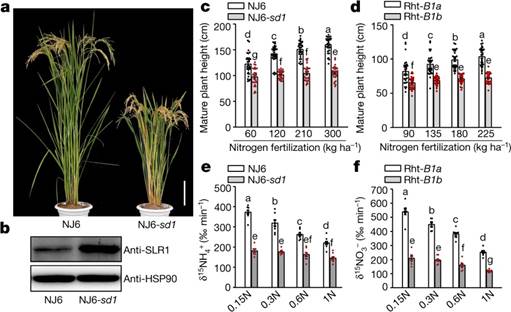研究发现新“绿色革命”作物关键基因
来源:《自然》
作者:Shan Li等
时间:2018-08-23

中国水稻种植面积占世界水稻种植面积的20%,但氮肥用量却占全球用量的37%。持续大量的氮肥投入,不仅浪费了资源和能源,还加剧了土壤酸化、水体富营养化和农业温室气体排放等一系列问题。8月16日,中国科学院遗传与发育生物学研究所傅向东课题组关于赤霉素信号传导途径调控植物氮肥高效利用的最新成果在线发表于《自然》杂志,傅向东课题组博士生李姗为该论文第一作者。
傅向东表示,该项成果深化了对于植物生长与代谢协同调控机制的认识,有助于培育绿色高产高效农作物新品种,从而找到了一条在保证粮食总产量不断增长的同时,提高氮肥利用率、降低生产成本、减少环境污染的可持续发展农业新途径。
上世纪60年代,以半矮化育种为特征的第一次“绿色革命”,使得全世界水稻和小麦产量翻了一番。但携带“绿色革命”基因的农作物中抑制植物生长的DELLA蛋白高水平积累,导致其对氮肥响应减弱和利用效率下降。
傅向东告诉《中国科学报》记者,课题组历时6年,从携带“绿色革命”基因的水稻资源材料中筛选到一个氮素吸收速率显著增加的新品系,通过QTL定位、图位克隆等技术,获得了氮肥高效利用的关键基因GRF4。
该研究证实了GRF4是一个植物碳—氮代谢的正调控因子,在上调了GRF4的表达后,“绿色革命”水稻和小麦品种在维持半矮秆、高产量性状的同时,氮利用效率明显上升。研究还发现了一个新型的优异等位基因GRF4ngr2。
该研究不仅丰富了对于赤霉素信号传导分子机制的认识,而且从分子水平阐明了“绿色革命”矮秆育种伴随氮肥利用效率低下的原因,并提出了明确的解决方案。
日本名古屋大学教授松冈信同期发表评述指出,这项发现为“少投入、多产出”的绿色高产高效农作物新品种培育提供了具有育种利用价值的新基因资源,预示着一场新的“绿色革命”即将到来。(来源:生物谷Bioon.com)
Modulating plant growth–metabolism coordination for sustainable agriculture
Abstract Enhancing global food security by increasing the productivity of green revolution varieties of cereals risks increasing the collateral environmental damage produced by inorganic nitrogen fertilizers. Improvements in the efficiency of nitrogen use of crops are therefore essential; however, they require an in-depth understanding of the co-regulatory mechanisms that integrate growth, nitrogen assimilation and carbon fixation. Here we show that the balanced opposing activities and physical interactions of the rice GROWTH-REGULATING FACTOR 4 (GRF4) transcription factor and the growth inhibitor DELLA confer homeostatic co-regulation of growth and the metabolism of carbon and nitrogen. GRF4 promotes and integrates nitrogen assimilation, carbon fixation and growth, whereas DELLA inhibits these processes. As a consequence, the accumulation of DELLA that is characteristic of green revolution varieties confers not only yield-enhancing dwarfism, but also reduces the efficiency of nitrogen use. However, the nitrogen-use efficiency of green revolution varieties and grain yield are increased by tipping the GRF4–DELLA balance towards increased GRF4 abundance. Modulation of plant growth and metabolic co-regulation thus enables novel breeding strategies for future sustainable food security and a new green revolution.
原文链接:https://www.nature.com/articles/s41586-018-0415-5.pdf




